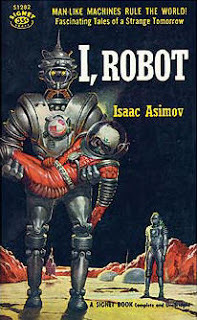'I, Robot.' You what?
 So I'm doing an after-dinner talk about robots and AI in SF for SICSA's PhD student conference and by way of introduction I say something that I only thought of that afternoon. Which is that as an SF writer I sometimes get asked to speak at events like this, relating SF to the actual practice of a discipline, and that it's just occurred to me that in every case SF owes that field an apology for getting it wrong. Take surveillance studies, for instance: we gave them Nineteen Eighty-Four, which is all about real-time surveillance rather than the accumulation and storage of records. This has people worked up about surveillance cameras and quite blasé about Google (etc) tracking their every move.Or take genomics, an area in which I've been quite involved, and the technologies associated with it: genetic engineering and genetic medicine. The SF template for these has been provided by Brave New World and Frankenstein. What these works have spawned, regardless of the intent of their creators, is a great lumbering monster of reactionary anxieties.And robotics, computer science, and AI? Yup, we did it again, from Čapek onwards (not to mention Mary Shelley's creature). And even when Eano Binder and Isaac Asimov had taken a hammer to the Revolt of the Robots cliché, almost all SF about robots and AI has dealt not with likely consequences but about, well, us: distinctively human-centred themes of labour, slavery, consciousness, identity; and the anxieties provoked when we see, or imagine, these replicated in a machine.And then I went on to give my talk about how SF has dealt with these. What I wonder, though, thinking about this, is whether there's any area of human endeavour or inquiry which has featured largely in SF, and that SF has handled in a way that hasn't been an utterly cringe-making travesty of what it's actually about.Suggestions welcome.
So I'm doing an after-dinner talk about robots and AI in SF for SICSA's PhD student conference and by way of introduction I say something that I only thought of that afternoon. Which is that as an SF writer I sometimes get asked to speak at events like this, relating SF to the actual practice of a discipline, and that it's just occurred to me that in every case SF owes that field an apology for getting it wrong. Take surveillance studies, for instance: we gave them Nineteen Eighty-Four, which is all about real-time surveillance rather than the accumulation and storage of records. This has people worked up about surveillance cameras and quite blasé about Google (etc) tracking their every move.Or take genomics, an area in which I've been quite involved, and the technologies associated with it: genetic engineering and genetic medicine. The SF template for these has been provided by Brave New World and Frankenstein. What these works have spawned, regardless of the intent of their creators, is a great lumbering monster of reactionary anxieties.And robotics, computer science, and AI? Yup, we did it again, from Čapek onwards (not to mention Mary Shelley's creature). And even when Eano Binder and Isaac Asimov had taken a hammer to the Revolt of the Robots cliché, almost all SF about robots and AI has dealt not with likely consequences but about, well, us: distinctively human-centred themes of labour, slavery, consciousness, identity; and the anxieties provoked when we see, or imagine, these replicated in a machine.And then I went on to give my talk about how SF has dealt with these. What I wonder, though, thinking about this, is whether there's any area of human endeavour or inquiry which has featured largely in SF, and that SF has handled in a way that hasn't been an utterly cringe-making travesty of what it's actually about.Suggestions welcome.
Published on May 28, 2011 13:16
No comments have been added yet.
Ken MacLeod's Blog
- Ken MacLeod's profile
- 762 followers
Ken MacLeod isn't a Goodreads Author
(yet),
but they
do have a blog,
so here are some recent posts imported from
their feed.



